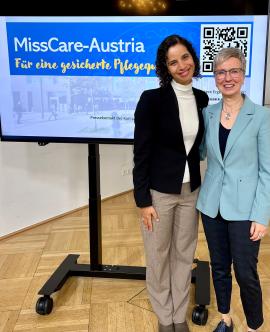84% of care teams must cancel necessary patient care in hospital
The results of the MISSCARE Austria study by Karl Landsteiner Private University show the situation of nursing in Austrian hospitals.

Austria has one of the highest hospital bed densities in Europe. On the other hand, there is a low number of nursing staff per hospital bed. Whether this situation is also reflected in a lack of patient care was investigated within the framework of the MISSCARE Austria study at the Karl Landsteiner University of Health Sciences in Krems. The researchers Ana Cartaxo, MSc and Prof. Dr. Hanna Mayer from the Department of Nursing Science with a focus on Person-Centred Care Research at the University of Krems and the nursing scientist Inge Eberl from the Faculty of Social Work at the Catholic University of Eichstätt-Ingolstadt looked specifically at the phenomenon of implicit rationing of nursing activities - also called Missed Nursing Care.
The nursing scientists interviewed more than 1000 nurses in general wards in Austrian hospitals. The results of the study presented today together with Mag.a Elisabeth Potzmann (ÖGKV President) confirmed the assumption that care can only be provided incompletely: 84% of the nurses surveyed stated that they and/or their team implicitly ration at least one of the interventions necessary for patient care. This mainly concerns nursing activities that belong to the core competence area of the nursing professions.
Frequently omitted are e.g.:
emotional support (67.5%)Conversation with patients and relatives (60,6%)Monitoring of cognitively impaired patients (48.4%)Counselling and training for discharge (48.1%)Mobilisation of patients (47.6%)The adequacy of nursing staffing was also surveyed. Only 3.6% of the respondents stated that this was always the case on their ward in the past 3 months. Staffing was rarely adequate for 50.4% and never for 17.4%. In the survey, 74.6% of the participants also said they were thinking of leaving the nursing profession. "The clear correlations between the omission of fundamentally necessary nursing care, lack of nursing staff resources, low job satisfaction and the intention of nurses to leave the nursing profession should now lead to consequences for nursing science research in Austria and for the further development of the role of professional nursing," summarises study author Ana Cartaxo, MSc.
Ultimately, missed nursing care also leads to a reduction in patient safety. This is a development that needs to be monitored. "Implicit rationing of nursing activities (Missed Nursing Care), in combination with the question of the subjective appropriateness of staffing, would - if surveyed regularly - not only be a good monitor of nursing quality, but also a very good predictor of an impending nursing or care emergency," adds Univ.Prof.in Dr.in Hanna Mayer, Head of the Department of Nursing Science with a focus on Person-Centred Care Research at KL. And Mag.a Elisabeth Potzmann, President of the Austrian Health and Nursing Association (ÖGKV) also states: "What we in nursing have long perceived and complained about emotionally is now proven with figures. It is time to act."
The study authors:Ana Valente dos Santos Cartaxo, MSc (research assistant in the Department of Nursing Science with a focus on Person-Centred Care Research, Karl Landsteiner Private University for Health Sciences, scholarship holder of the Austrian Academy of Sciences (DOC), doctoral student at the Vienna Doctoral School of Social Sciences at the University of Vienna).Univ.-Prof. Mag.a Dr. Hanna Mayer (Head of the Department of Nursing Science with focus on Person-Centred Care Research, Karl Landsteiner Private University for Health Sciences)Prof. Dr. Inge Eberl (Vice Dean and Professor of Nursing Science, Catholic University of Eichstätt-Ingolstadt, Faculty of Social Work, Eichstätt) The study was supported by the Austrian Academy of Sciences, Austrian Health and Nursing Association (ÖGKV), HeilberufeSience/Springer Verlag, Pflegenetz and Lazarus PflegeNetzwerk. Enquiries & contact:Austrian Health and Nursing Association+43 1 478 27 10-17pr@oegkv.athttp://www.oegkv.at




